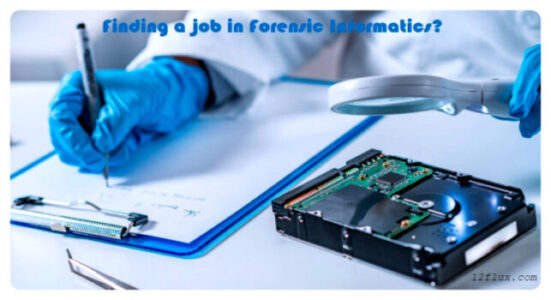Finding a job in Forensic Informatics ..? Do you genuinely believe that you have control over all of your valued possessions, even the trillions of dollars in annual transactions? If you said “yes,” I’m confident you’ve already created a comprehensive and adaptable cybersecurity strategy. If not, you should think about creating one.
With the advent of the digital age, cybercrime is constantly rising. After all, many high school students get into networks in their free time. And these cheaters are the ones that start most current attacks.
In the highly specialized discipline of forensic informatics, investigators are tasked with identifying or preventing cybercrime on behalf of law enforcement. These professionals work mostly on computers in an office or computer lab environment.
A computer forensics specialist mostly deals with computer systems, hard drives, CDs, and a few other storage devices, electronic documents, emails, JPEG images, etc. For working on digital artifacts such as files.
Job description
As I said earlier, forensics is a trained professional who works with law enforcement and private companies to retrieve all the missing information from computers. Or other electronic devices. As an analyst, you’ll need to work within law enforcement, and he or she may test the security of a private company’s information system. In addition, as a forensic expert, you must also carry excellent working knowledge of all aspects of the computer world. And if you’re considering a serious career in this field, always remember that patience and a willingness to work long hours are well suited for this position.
Job Duties
During any criminal investigation, an analyst recovers and examines data from computers and electronic devices to use the data as evidence in criminal prosecutions. In the event of any damage to the equipment, the forensic expert should be capable of dismantling and rebuilding the system to recover lost data.
Once all this is done, you should write the white paper detailing how the evidence was discovered and all steps taken in the access process.
How to make a career in Forensic Informatics?
Step 1- Earn a degree
To become a researcher, you must have at least a bachelor’s degree to enter the field. More and more colleges offer bachelor’s and master’s degrees in specialties such as Forensic specialization, where you can gain skills needed in both research and computer use.
Step 2- Find a job
Forensic jobs can be found at all levels of law enforcement. Starting with smaller agencies such as city police departments, and a National security agency with larger ones. Such as homeland security offices will have an increasing need for these investigations. So approach them and get a job.
Step 3- Advance your career with experience
Now there are two ways to learn, you can learn by learning and second, you can learn by doing. It’s time to explore the second path i.e. advance your career by conducting computer forensics investigation. Finding a job in Forensic Informatics can be easy for you if you follow the above steps. However, You can even start your consulting agency or private practice.
Also Read: Job Posting Is Like A Product Advertisement



